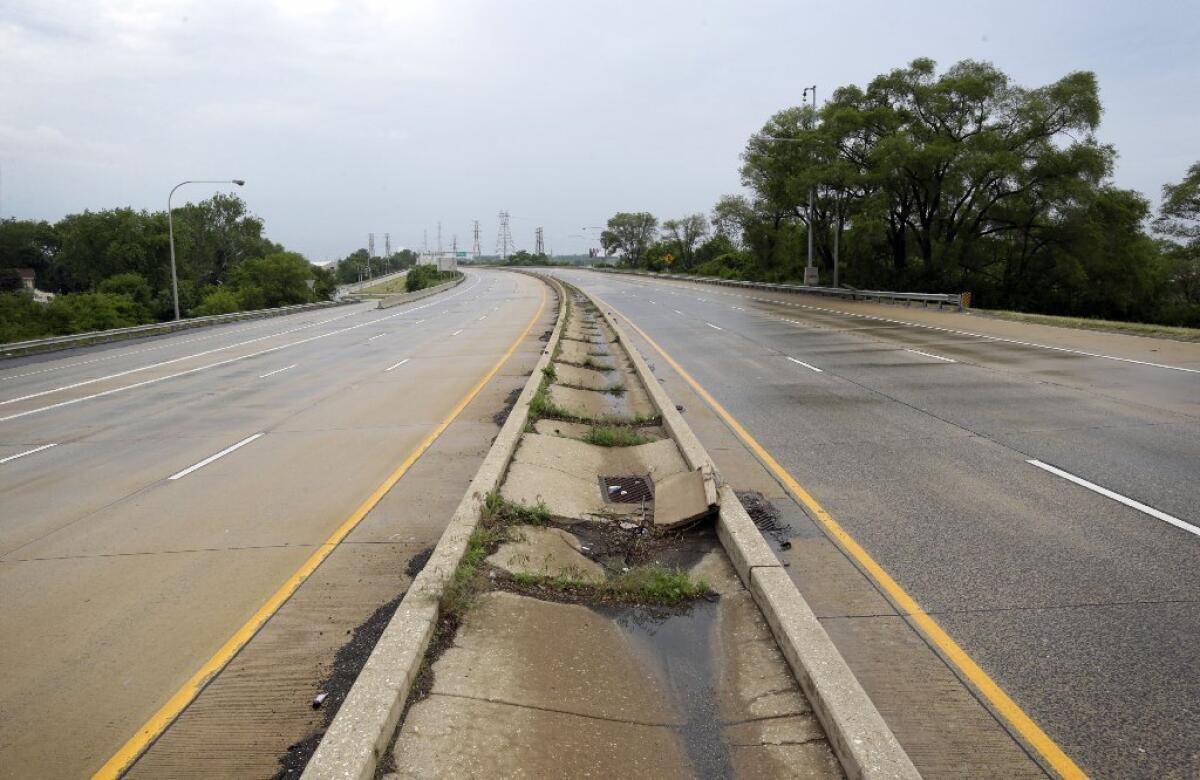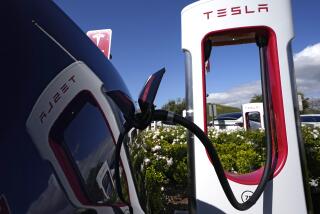Editorial: To repair the Highway Trust Fund, raise the fuel tax

In 1993, Bill Clinton was president, “Seinfeld” was on TV and a cellphone was the size of a brick. It was also the last time Congress raised the federal gasoline tax, which pays for roads, bridges and public transit. Over two decades, the cost of building and maintaining the nation’s transportation infrastructure has gone up significantly, while the tax designed to fund the work has stayed flat: Drivers still pay 18.4 cents per gallon at the pump for gasoline and 24.4 cents for diesel.
It should be no surprise, then, that the Highway Trust Fund is about to go broke. The U.S. Department of Transportation estimates that the fund could run out of money as soon as August, which means states will not receive the federal dollars they’ve been promised until the fund is replenished. If that happens, federally funded transportation projects may have to stop or slow construction, and new transportation projects could be delayed, putting thousands of construction jobs at risk.
This is not a new problem. The failure to raise the tax to keep up with inflation, coupled with the growing fuel efficiency of the nation’s vehicle fleet, has whittled away the buying power of the fund over many years. The gasoline tax currently generates about $35 billion a year, but the federal government spends $53 billion on highway and transit projects. Since 2008, Congress has transferred in general fund tax revenue to cover the shortfall. This year, gas tax revenue is coming in even lower than projected.
Congress and the Obama administration have proposed various ways to refill the trust fund. The administration wants to close corporate tax loopholes and use the revenue to expand highway and transit funding for four years. Senate Majority Leader Harry Reid (D-Nev.) and Sen. Rand Paul (R-Ky.) want to replenish the fund by encouraging U.S. companies to repatriate offshore profits in return for a one-time tax break, while House Speaker John A. Boehner (R-Ohio) would generate money for the fund by cutting Saturday postal service. These are short-term solutions at best.
Congress needs to fix the fund, starting with an increase in the fuel tax. Last week, Republican Sen. Bob Corker of Tennessee and Democratic Sen. Chris Murphy of Connecticut offered a common-sense proposal to raise the fuel taxes by 12 cents over the next two years and set future annual increases at the rate of inflation — so it won’t take another two decades and another transportation funding cliff to keep the money coming in. Usually any bill that raises taxes in an election year is a nonstarter. We hope Congress makes an exception for this bipartisan proposal. After all, President Reagan presided over a gas tax increase, as did Clinton. Americans place a high priority on infrastructure and should recognize that a user fee cannot stay flat for 20 years without repercussions.
The gas tax faces another long-term problem: Federal law requires automakers to double fuel economy by 2025, and that means less demand for fuel and therefore less gas tax revenue. There have been proposals to scrap the sales tax on fuel and replace it with a tax per barrel of oil or one on the wholesale price of oil. Those ideas are worth exploring, but oil taxes would face a similar problem as the gas tax — namely, that increased fuel economy means less demand for oil and therefore less tax revenue. Also, a tax on oil, as opposed to refined fuel, would undermine the “user fee” system envisioned by the creators of the trust fund.
Transportation planners are increasingly pushing to get rid of the fuel tax altogether and switch to a system that would tax motorists based on how much they actually use the roads. Oregon, which like all states imposes its own version of the gas tax, will launch a voluntary program next year in which residents can pay a fee per vehicle-mile traveled instead of the state’s per-gallon gas tax. In California, state Sen. Mark DeSaulnier (D-Concord) would create a pilot project to test a mileage-based fee. There are concerns that mileage-based taxes would disproportionately affect rural residents who have to drive longer distances, as well as questions about privacy if the government tracks drivers’ movements. California would be wise to test a mileage-based tax system now to determine whether these issues outweigh the benefits of what would be a stable source of state and, possibly, federal transportation funding.
More to Read
A cure for the common opinion
Get thought-provoking perspectives with our weekly newsletter.
You may occasionally receive promotional content from the Los Angeles Times.






